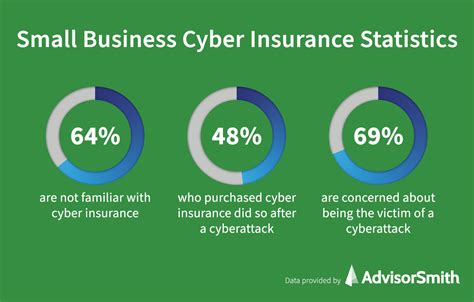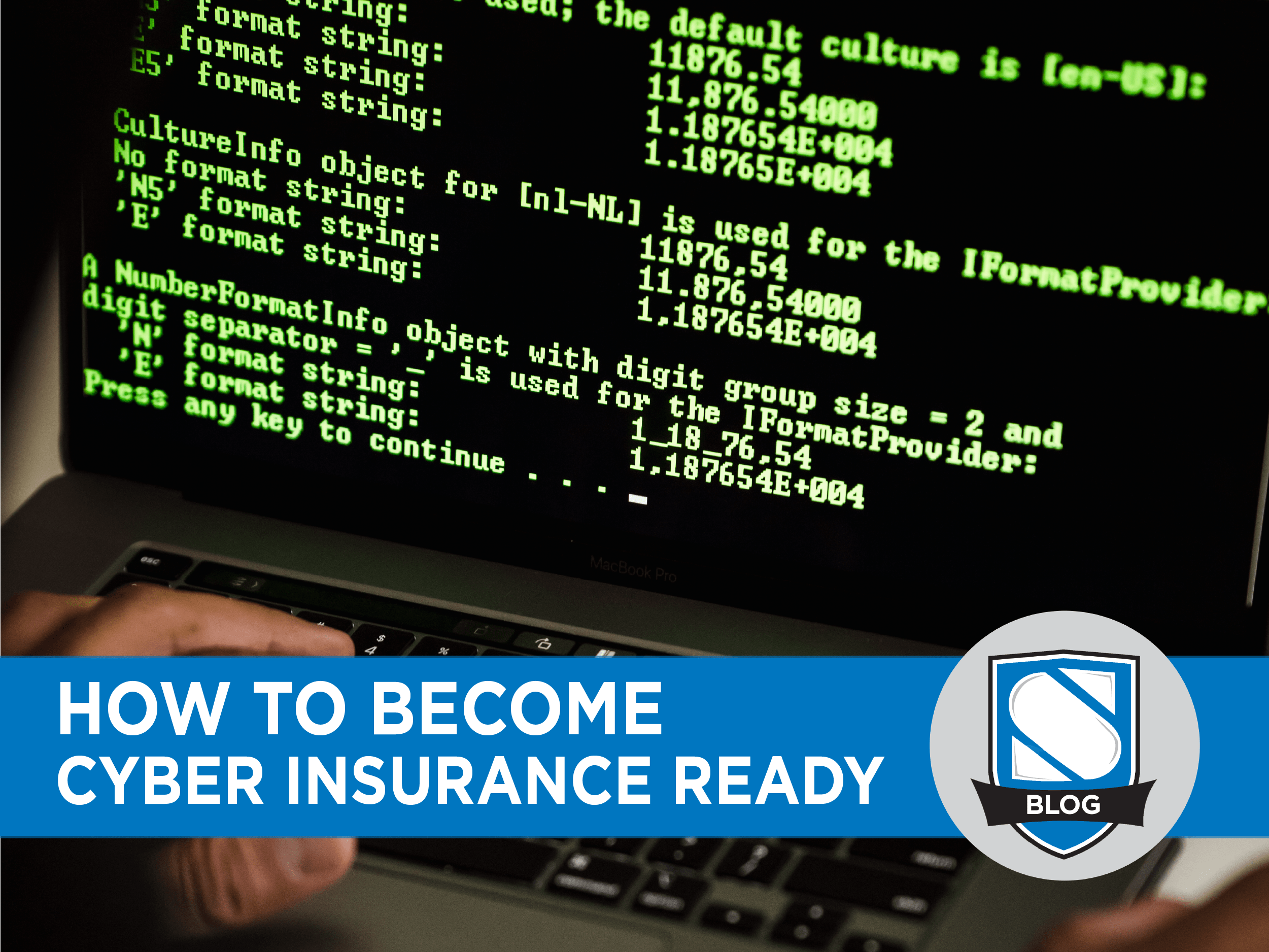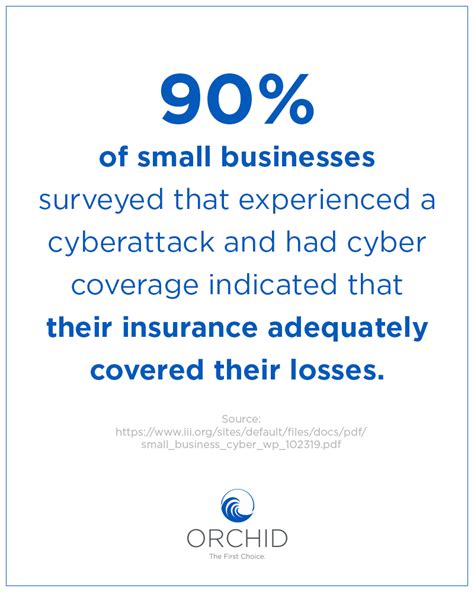Cyber Insurance For Small Businesses

Protecting Your Small Business: A Comprehensive Guide to Cyber Insurance

In today's digital landscape, small businesses face an ever-growing threat of cyber attacks and data breaches. The consequences can be devastating, leading to financial losses, reputational damage, and even the collapse of an entire enterprise. This is where cyber insurance steps in as a crucial safeguard, offering protection and peace of mind to small business owners. In this article, we will delve into the world of cyber insurance, exploring its importance, coverage options, and the steps to secure the right policy for your business.

Understanding the Cyber Threat Landscape
The digital realm is a double-edged sword for small businesses. While it opens up immense opportunities for growth and connectivity, it also exposes businesses to a multitude of cyber threats. From sophisticated phishing scams to ransomware attacks and data breaches, the methods employed by cybercriminals are constantly evolving and becoming more intricate.
Consider the case of SmallBizInc, a thriving online retailer that experienced a data breach resulting in the exposure of customer credit card information. The fallout was immediate: not only did they face hefty fines and legal battles, but their reputation took a severe hit, leading to a significant decline in customer trust and sales. This incident highlights the critical need for robust cyber protection measures.
According to a recent report by CyberSecurityStats, small businesses are particularly vulnerable, accounting for over 43% of all cyber attacks. With limited resources and often inadequate security measures, they are an attractive target for cybercriminals seeking easy access to sensitive data. The potential consequences are dire, ranging from financial ruin to long-term business disruptions.
The Role of Cyber Insurance: A Safety Net for Your Business

Cyber insurance has emerged as a vital tool in the battle against cyber threats, offering a safety net for small businesses. It provides financial protection and support in the event of a cyber incident, helping businesses navigate the complex aftermath and ensuring their survival.
Imagine a small marketing agency, DigitalPro, that falls victim to a ransomware attack. The attackers demand a hefty ransom, threatening to expose sensitive client data. Without cyber insurance, DigitalPro would be faced with a difficult decision: pay the ransom and hope for the best, or risk losing valuable clients and reputation. With cyber insurance, however, they can access the necessary resources to respond effectively, mitigate the damage, and continue operating without financial strain.
The benefits of cyber insurance extend beyond financial coverage. It also provides access to a network of cybersecurity experts and resources, offering guidance and support throughout the recovery process. This includes assistance with incident response, data recovery, legal consultations, and public relations management to help restore business operations and customer trust.
Exploring Cyber Insurance Coverage Options
Cyber insurance policies come in various forms, offering different levels of protection and coverage. Understanding these options is crucial to ensure your small business is adequately safeguarded.
First-Party Coverage
First-party coverage is a fundamental aspect of cyber insurance, providing direct protection to your business in the event of a cyber incident. It covers a range of expenses and losses, including:
- Data Breach Response: Covers the costs associated with investigating and containing a data breach, such as forensic analysis, legal consultations, and notification to affected parties.
- Business Interruption: Provides financial support to cover lost income and additional expenses during the period when your business is unable to operate normally due to a cyber incident.
- Data Recovery: Assists in recovering and restoring data lost or damaged as a result of a cyber attack, including the costs of data restoration and replacement hardware.
- Cyber Extortion: Offers protection against ransomware attacks and other forms of cyber extortion, including the costs of negotiating with attackers and potentially paying ransoms (if advised by experts and permitted by the policy).
- Crisis Management: Provides access to public relations and crisis management experts to help restore your business's reputation and manage the fallout from a cyber incident.
Third-Party Coverage
Third-party coverage focuses on protecting your business from legal liabilities arising from cyber incidents that impact your customers, partners, or other third parties.
- Network Security and Privacy Liability: Covers legal defense costs and damages if your business is sued for a data breach or privacy violation resulting from a cyber attack.
- Media Liability: Provides protection against lawsuits arising from online content, such as defamation or copyright infringement claims related to your website or social media presence.
- Regulatory Defense and Penalties: Offers financial support for legal defense and penalties imposed by regulatory bodies for non-compliance with data protection laws, such as GDPR or HIPAA.
Optional Add-Ons and Endorsements
In addition to the core coverage options, cyber insurance policies often provide flexibility through optional add-ons and endorsements. These allow you to tailor the policy to your specific business needs and industry requirements.
- Cyber Crime Coverage: Protects against financial losses resulting from cyber crimes, such as social engineering, phishing, and business email compromise.
- Cyber Terrorism Coverage: Covers losses from cyber attacks motivated by political, ideological, or social agendas, which are often excluded from standard policies.
- Cyber Extortion Expense Reimbursement: Provides additional coverage for expenses incurred during a cyber extortion incident, such as the costs of engaging a cybersecurity firm or negotiating with attackers.
- Cyber Crisis Management: Offers enhanced crisis management services, including access to a dedicated crisis management team and specialized communication strategies.
Evaluating Your Cyber Insurance Needs
Determining the right level of cyber insurance coverage for your small business requires a comprehensive evaluation of your unique risks and vulnerabilities. Here are some key factors to consider:
Industry-Specific Risks
Different industries face varying levels of cyber threats. For instance, healthcare businesses must comply with strict data protection regulations like HIPAA, while e-commerce businesses handle vast amounts of sensitive customer data. Understanding the specific risks associated with your industry is crucial in tailoring your cyber insurance coverage.
| Industry | Specific Risks |
|---|---|
| Healthcare | HIPAA compliance, patient data protection, medical device security |
| E-commerce | Payment card data security, customer privacy, online fraud |
| Financial Services | Data security for financial transactions, anti-money laundering regulations |

Data Sensitivity and Volume
The type and volume of data your business handles play a significant role in determining your cyber insurance needs. Businesses that collect and store sensitive customer information, such as social security numbers or financial data, face higher risks and may require more comprehensive coverage.
Regulatory Compliance
Adherence to data protection regulations is not only a legal requirement but also a critical factor in cyber insurance. Policies often provide coverage for regulatory fines and penalties, but only if your business maintains compliance with relevant laws. Stay informed about the regulations applicable to your industry and ensure your practices meet the necessary standards.
Existing Security Measures
Assessing your current cybersecurity infrastructure is essential. Evaluate the effectiveness of your security protocols, employee training programs, and incident response plans. Insurance providers often offer discounts or enhanced coverage to businesses that demonstrate a strong commitment to cybersecurity.
Choosing the Right Cyber Insurance Provider
With a wide range of cyber insurance providers in the market, selecting the right one can be a daunting task. Here are some key considerations to guide your decision:
Reputation and Financial Stability
Opt for established insurance companies with a proven track record in the industry. Check their financial stability ratings and customer satisfaction reviews to ensure they are capable of providing long-term support and paying out claims efficiently.
Specialization in Cyber Insurance
Choose a provider that specializes in cyber insurance. These companies often have a deeper understanding of the unique risks and complexities associated with cyber threats, allowing them to offer more tailored and comprehensive coverage.
Policy Flexibility and Customization
Look for providers that offer flexible policies, allowing you to customize coverage to align with your specific business needs. This ensures you are not paying for unnecessary coverage while still maintaining adequate protection.
Claims Handling and Response
Inquire about the provider’s claims process and response times. Efficient and timely claims handling is crucial during a cyber incident. Ensure the provider has a dedicated team of experts who can provide immediate support and guidance when you need it most.
The Cyber Insurance Application Process
Applying for cyber insurance involves a thorough assessment of your business's cyber risks and security practices. Here's a step-by-step guide to help you navigate the process:
1. Conduct a Comprehensive Risk Assessment
Start by evaluating your business’s vulnerabilities and potential cyber threats. Identify areas where your security measures may fall short and assess the impact of a potential cyber incident on your operations and reputation.
2. Gather Relevant Documentation
Prepare the necessary documentation, including financial statements, cybersecurity policies and procedures, and any existing insurance policies. These documents will provide a comprehensive view of your business’s current risk management practices.
3. Consult with an Insurance Broker
Engage the services of a reputable insurance broker who specializes in cyber insurance. They can guide you through the application process, help you understand the policy terms and conditions, and negotiate the best coverage and premiums for your business.
4. Review and Compare Quotes
Obtain quotes from multiple insurance providers and carefully review the coverage, exclusions, and premiums. Compare the policies side by side to ensure you are getting the most comprehensive coverage at a competitive price.
5. Negotiate and Finalize the Policy
Based on your risk assessment and budget, negotiate with the insurance provider to tailor the policy to your needs. Ensure you understand all the terms and conditions, including any deductibles or limitations, before finalizing the policy.
Post-Policy: Maintaining Your Cyber Insurance Coverage
Securing cyber insurance is just the beginning. To ensure ongoing protection, it's essential to maintain and regularly review your policy.
1. Regular Policy Reviews
Schedule regular reviews of your cyber insurance policy, ideally on an annual basis or whenever significant changes occur in your business operations or cybersecurity practices. This ensures your coverage remains aligned with your evolving needs.
2. Stay Informed about Cyber Threats
Keep yourself and your employees updated on the latest cyber threats and best practices for cybersecurity. Attend industry workshops, follow reputable cybersecurity blogs, and participate in cyber awareness campaigns to stay ahead of emerging risks.
3. Implement Recommended Security Measures
Your insurance provider may offer recommendations or requirements for improving your cybersecurity posture. Implement these measures to not only enhance your protection but also potentially qualify for premium discounts or expanded coverage.
4. Test and Improve Your Incident Response Plan
Regularly test and update your incident response plan to ensure it remains effective and aligned with industry best practices. Conduct simulated cyber attack drills and review your plan with your insurance provider to identify areas for improvement.
The Future of Cyber Insurance: Trends and Innovations
The field of cyber insurance is continuously evolving to keep pace with the ever-changing cyber threat landscape. Here are some key trends and innovations shaping the future of cyber insurance:
1. Enhanced Data Protection Coverage
As data breaches and privacy violations become more prevalent, cyber insurance providers are expanding their coverage to include enhanced protection for sensitive data. This includes coverage for data loss prevention, data encryption, and privacy breach response services.
2. Artificial Intelligence and Machine Learning
AI and machine learning technologies are revolutionizing the way cyber insurance is delivered. These technologies enable more accurate risk assessments, improved fraud detection, and enhanced claims handling processes, leading to more efficient and effective insurance solutions.
3. Cybersecurity as a Service
Some cyber insurance providers are offering cybersecurity services as part of their policies. This includes access to dedicated cybersecurity experts, incident response teams, and threat intelligence platforms, providing small businesses with the resources and expertise to bolster their cybersecurity defenses.
4. Collaborative Risk Sharing
Insurance providers are exploring innovative models for risk sharing, such as parametric insurance and risk pools. These models allow businesses to share the financial burden of cyber incidents, providing more accessible and affordable coverage options for small businesses.
Conclusion
Cyber insurance is a critical component of a small business's risk management strategy in today's digital age. By understanding the cyber threat landscape, evaluating your unique risks, and securing the right cyber insurance coverage, you can protect your business from the devastating impacts of cyber attacks and data breaches. Remember, the key to effective cyber insurance is staying informed, proactive, and adaptable in the face of evolving cyber threats.
What is the average cost of cyber insurance for small businesses?
+The cost of cyber insurance for small businesses can vary depending on factors such as industry, revenue, and cybersecurity measures in place. On average, small businesses can expect to pay between 500 and 3,000 annually for a basic cyber insurance policy. However, premiums can increase significantly based on the level of coverage and specific business needs.
How does cyber insurance differ from traditional business insurance policies?
+Traditional business insurance policies often do not cover cyber-specific risks. Cyber insurance, on the other hand, is designed specifically to address the unique challenges posed by cyber threats, including data breaches, ransomware attacks, and privacy violations. It provides financial protection and resources to help businesses recover from cyber incidents.
Can I get cyber insurance even if my business has already experienced a cyber attack?
+Yes, it is still possible to obtain cyber insurance even if your business has previously experienced a cyber attack. However, the availability and cost of coverage may be impacted by the severity and frequency of past incidents. It’s essential to be transparent with your insurance provider about your cyber attack history during the application process.



